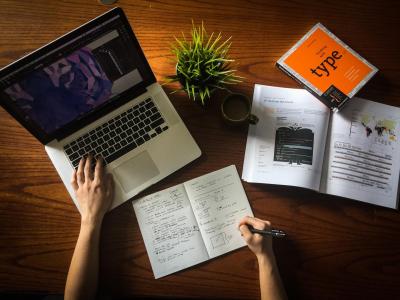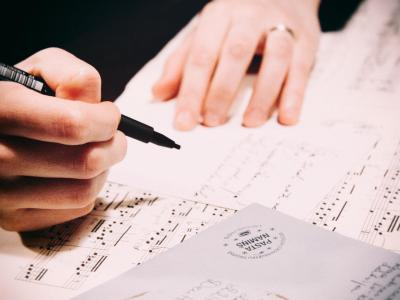12 Weeks
Level 2
3-Credit Tuition
$1,545Non-Credit Tuition
$1,290Creative Writing: Poetry is a course for writers—songwriters, poets, and anyone who wants to write more effectively. The course—authored by Pat Pattison, who developed the curriculum for the only songwriting major in the country at Berklee—will give you specific tools to help you craft and control your writing. You will be taken through a step-by-step process, each step handing you another tool to give what you say more power. You'll learn how to enhance your ideas through arranging lines into odd or even numbered line groups and creating either a feeling of tension or resolution with the composition itself, independent of the poem's meaning. You'll learn placement, timing, focus, and especially how to use rhythm in language expressively.
The course uses musical vocabulary to examine the elements and functions of poetry, exploring how to make things move and stop, stop and move, just like in music. You'll see how the compositional aspects of poetry create their own music, independent of what's being said, and act like a film score to underpin and color your ideas.
The course provides examples from great poetry—both via text and video—from such poets as Shakespeare, Percy Bysshe Shelley, John Keats, Ralph Waldo Emerson, Elizabeth Barrett Browning, Henry Wadsworth Longfellow, Alfred Lord Tennyson, Algernon Charles Swinburne, William Butler Yeats, Robert Frost, D.H. Lawrence, e.e. cummings, W.H. Auden, Howard Nemerov, Allen Ginsberg, Galway Kinnell, and others. The focus of the course is not on inspiration and "flowology," though it will help you shape your inspiration more powerfully. Rather, the focus is on composition and how to craft your writing for maximum effect.
Each week, you'll have a new poem and a new tool to manipulate, moving through the counter-pointing of lines against phrases, use of rhythmic composition in blank verse, and ending in two traditional sonnet forms. When you post your poem, the instructor and your classmates will comment on your work, with special focus on how your structures help color and enhance your ideas. By the course's end, you will see poetry differently, both in terms how to approach writing in general, as well as the way that poetry can positively affect your lyrical output.
By the end of the course, you will be able to:
- Write clearly and strongly
- Precisely control form and composition
- Counter-point lines against phrases to create musical effects
- Use language rhythms to create tension and resolution
- Understand the relationship between poetry and music
- Deeply understand prosody, the fundamental principle underlying not only poetry, but art in general
Syllabus
Lesson 1: Prose vs. Poetry
- Prose: Phrase Lengths
- Sentence Construction: Simple Sentences
- Compound Sentences
- Sentence Types
- Poetry
- Phrases
- Lines with Multiple Phrases
- Units of Composition
- Prosody
Lesson 2: Managing End-Stops
- Creating Subordinate Clauses
- Stable and Unstable Groupings
- "Days" by Ralph Waldo Emerson
- Instability
- Student Poetry Examples
- Switching Line Order
Lesson 3: Managing Caesuras
- Caesuras
- Frontal, Medial, and Terminal Caesuras
- Creating Tension
- Emerson's Handling of Caesuras
- Creating Motion
Lesson 4: Managing Enjambment
- Enjambment
- Moving from Light to Heavy
- Other Movement
- Managing Enjambment
Lesson 5: Writing in Iambic Pentameter
- Stressed and Unstressed Syllables
- Iambic Pentameter
- Blending Languages
- Why Pentameter?
- English Poetry
- Groove and Variation
- "Distractions" by Emma Joy Hanley
- "The Woman with Fire Engine Nails" by Caroline Harvey
- Learning your Craft
Lesson 6: Substituting in Iambic Pentameter
- Substituting in Iambic Pentameter
- Themes and Variations
- Creating Emotion
- "After Long Silence" by William Butler Yeats
- Substitutions in "After Long Silence"
- Going Against Expectations
Lesson 7: Writing in Blank Verse
- Writing in Blank Verse
- "Birches" by Robert Frost
- "Ulysses" by Alfred, Lord Tennyson
- Compositional Tools
- "Spring" by Elisa Lomazzo
- "Christmas Cheer" by Ian Henchy
Lesson 8: Blank Verse Again
- More on Blank Verse
- Blank Verse and Substitutions
- "A Wake" by Ryan Toll
- "Still" by Rachel Borovik
Lesson 9: Using Rhyme
- Using Rhyme
- Sound in Poetry
- Rhyme Schemes
- Perfect Rhyme
- Consonance Rhyme
- More on Consonance Rhyme
- Rhyme Schemes Revisited
- "Ode to the West Wind" by Percy Bysshe Shelley
- Using Rhyme
Lesson 10: English (or Shakespearean) Sonnet
- English or Shakespearean Sonnet
- Sequence
- Sonnet 29
- Sonnet 73
- "When I Have Fears" by John Keats
Lesson 11: English (or Shakespearean) Sonnet Continued
- Modern Sonnets
- "Putting in the Seed" by Robert Frost
- "Baby Running Barefoot" by D. H. Lawrence
Lesson 12: Italian (or Pertrarchian) Sonnet
- The Italian (or Petrarchian) Sonnet
- The First Eight Lines
- "In Memoriam"
- The Italian Sonnet Road Map
- Keats
- "Mezzo Cammin"
- "Grief"
- "Design"
- The ccdeed sestet
- e. e. cummings
- e. e. cummings Variation
Requirements
Prerequisites and Course-Specific Requirements
Prerequisite Courses, Knowledge, and/or Skills
All students enrolled in this course must know English well enough to:
- Easily understand recorded videos and written class lessons
- Participate successfully in written and oral class discussions
- Read, write, and study without being hindered by language problems
- Possess intermediate or advanced grammar skills related to punctuation and verb conjugation
Though the course uses a rudimentary musical vocabulary, no musical training is required.
Textbook(s)
- No textbooks required
Student Deals
After enrolling, be sure to check out our Student Deals page for various offers on software, hardware, and more. Please contact support@online.berklee.edu with any questions.
General Course Requirements
Below are the minimum requirements to access the course environment and participate in Live Classes. Please make sure to also check the Prerequisites and Course-Specific Requirements section above, and ensure your computer meets or exceeds the minimum system requirements for all software needed for your course.
Mac Users
PC Users
All Users
- Latest version of Google Chrome
- Zoom meeting software
- Webcam
- Speakers or headphones
- External or internal microphone
- Broadband Internet connection
Instructors
Author
Pat Pattison is a professor at Berklee College of Music, where he teaches lyric writing and poetry. In addition to his four books, Songwriting Without Boundaries (Penguin/Random House), Writing Better Lyrics, 2nd Edition (Penguin/Random House), The Essential Guide to Lyric Form and Structure (Hal Leonard), and The Essential Guide to Rhyming (Hal Leonard), Pat has developed several online courses for Berklee Online. He has written more than 50 articles for various blogs and magazines, including American Songwriter, and has chapters in both The Poetics of American Song Lyrics (University Press of Mississippi) and The Handbook on Creative Writing (Edinburgh University Press).
Pat continues to present songwriting clinics across the US, Canada, Australia, New Zealand, and Europe. His students include Grammy-winners, professional songwriters, and major recording artists, including Gillian Welch, John Mayer, Tom Hambridge, Joelle James, Karmin, American Authors, Ingrid Andress, Liz Longley, Charlie Worsham, Greg Becker, Justin Tranter, and many more.
For Berklee Online, Pat has authored the following courses: Lyric Writing: Writing From the Title, Lyric Writing: Writing Lyrics to Music, Lyric Writing: Tools and Strategies, Creative Writing: Poetry, and Creative Writing: Finding Your Voice. He also co-authored the graduate course Songwriting Tools and Techniques. Read Less
Instructor
Eric Leva is a songwriter, singer, producer, and classically trained pianist from Massachusetts. Leva has studied at the New England Conservatory of Music and Berklee College of Music. Following his studies, Leva spent time in New York City to hone his craft and develop his writing. A songwriting award from the ASCAP Foundation eventually sparked a move to Los Angeles to pursue more collaborations. His recent releases include Kesha, DNCE, Wes Period, and Rozzi.
Instructor
Sarah Anne Stinnett is a Boston-based writer and educator. She holds an MFA in Creative Writing from Lesley University and an ALM in Dramatic Arts and ALB in Humanities from Harvard University. Previously, she attended Berklee College of Music for bass performance, often extending her studies through the ProArts Consortium at Emerson College, Boston Conservatory, and the School of the Museum of Fine Arts.
Sarah Anne’s poetry appears or is forthcoming in Plume, Booth, Palette Poetry, Mom Egg Review, On the Seawall, Chicago Quarterly Review, Tar River Poetry, and elsewhere. Her work received Honorable Mention in Common Ground Review’s 2024 Annual Poetry Contest and won the 2020 Cambridge Sidewalk Poetry Contest, now incised in cement.
With Boston Dance Theater (BDT), Sarah Anne teaches voicework and embodied practices. Coaching and writing credits with BDT include Bodyspeaking supported by New England Foundation for the Arts, SURGE presented by Woods Hole Oceanographic Institution & Boston Center for the Arts, and Man of the Hour presented by Global Arts Live at the Institute of Contemporary Arts.
Sarah Anne has supported and taught speech, communication, and social media courses at Harvard Extension and Harvard Summer Schools since 2017; she offers a graduate course on oral interpretation of literary works at Lesley University; and she has instructed liberal arts courses at Berklee Online since 2022. Her core tenets in teaching are as in life: employ unparalleled curiosity, doing is discovering, and a life of learning is impelled by the study of the masters before. Read Less
What's Next?
When taken for credit, Creative Writing: Poetry can be applied towards the completion of these related programs:
Related Certificate Programs
Related Degree Majors
Questions?
Contact our Academic Advisors by phone at 1-866-BERKLEE (U.S.), 1-617-747-2146 (INT'L), or by email at advisors@online.berklee.edu.





